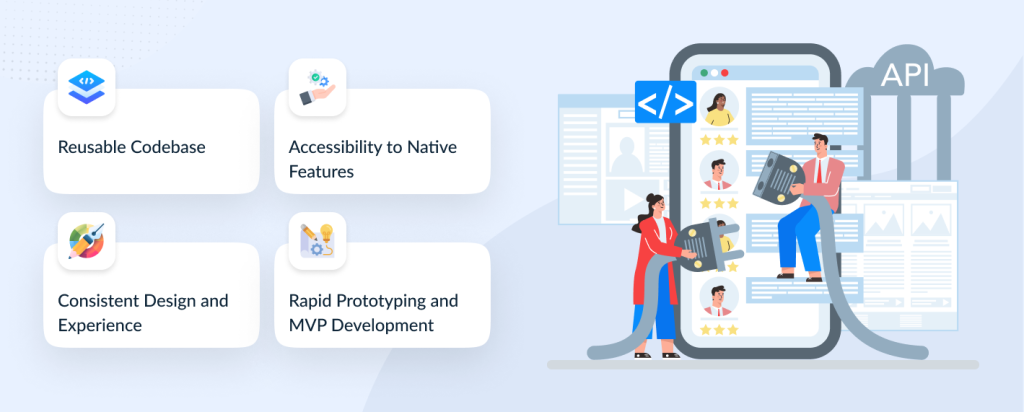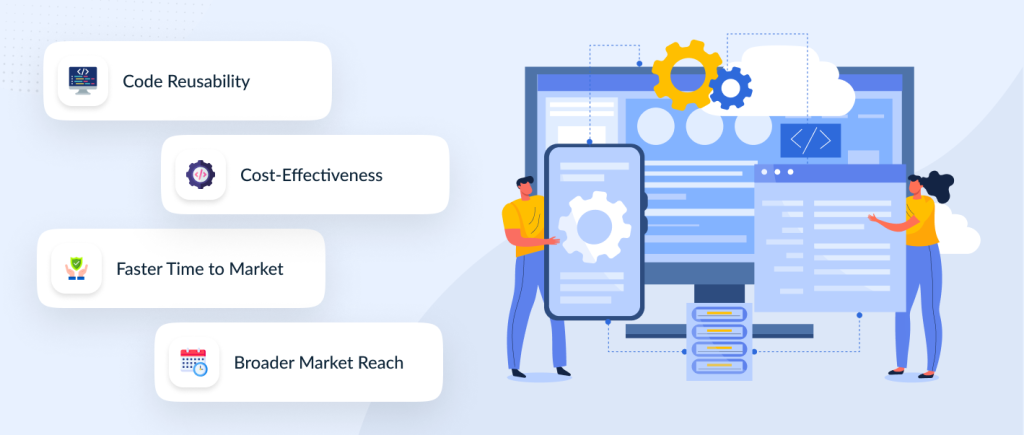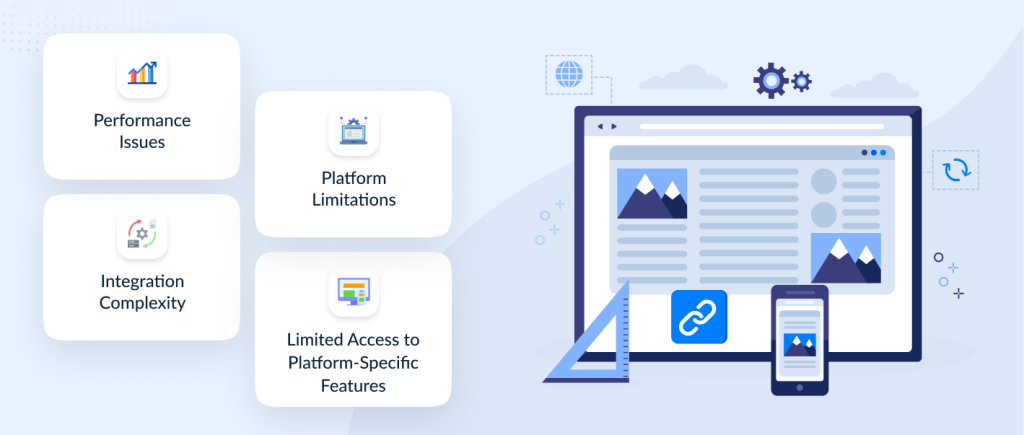In today’s digital age, where smartphones, tablets, laptops, and other devices dominate our daily lives, the demand for versatile and accessible applications has never been higher. As developers strive to meet the needs of a diverse user base across various platforms, the concept of cross-platform app development has emerged as a game-changer.
By enabling the creation of applications that can run seamlessly on multiple devices and operating systems, cross-platform app development offers many advantages, including reduced development time, cost-effectiveness, and broader market reach.
Understanding Cross-Platform App Development
Cross-platform app development refers to building software applications that can operate on multiple platforms, such as iOS, Android, Windows, and macOS, using a single codebase. Unlike traditional development approaches that require separate codebases for each platform, cross-platform app development frameworks allow developers to write code once and deploy it across multiple platforms, saving time and resources while ensuring consistency and scalability.
The Rise of Cross-Platform App Development Frameworks
Several cross-platform app development frameworks have gained prominence in recent years, each offering unique features and capabilities. Some of the most popular frameworks include:
React Native
Developed by Facebook, React Native has emerged as a leading choice for cross-platform mobile app development. Leveraging the power of JavaScript and React, React Native enables developers to build high-performance, native-like mobile applications for iOS and Android using a single codebase.
Flutter
Backed by Google, Flutter is an open-source UI toolkit for building natively compiled mobile, web, and desktop applications from a single codebase. With its fast rendering engine and expressive UI components, Flutter simplifies the process of creating beautiful and responsive apps across multiple platforms.
NativeScript
NativeScript allows developers to build cross-platform mobile applications using JavaScript, TypeScript, or Angular. It provides direct access to native APIs and UI components, enabling native performance and appearance.
Features of Cross-Platform App Development

Reusable Codebase: The use of a common codebase across multiple platforms can save developers time and effort. Data management, serialization, API calls, and analytics implementation are all simplified using this approach.
Accessibility to Native Features: Developers can use cross-platform frameworks to design apps that mimic native device features and APIs.
Consistent Design and Experience: From Windows to Linux to macOS, cross-platform applications ensure consistency in design and functionality across different operating systems. By doing so, users are not forced to learn how to use the application again as they transition from one device to another.
Rapid Prototyping and MVP Development: The ability to develop across platforms enables businesses to prototype and validate their ideas quickly.
Advantages of Cross-Platform App Development

Code Reusability
Cross-platform app development offers a significant advantage of reusing the same code across multiple platforms. By writing code once and deploying it across multiple platforms, developers can significantly reduce development time and effort while ensuring consistency and maintainability across different devices.
Cost-Effectiveness
Cross-platform app development allows businesses to reach a broader audience without investing in separate development teams or resources for each platform. By leveraging a single codebase and development framework, companies can save costs while maximizing their return on investment.
Faster Time to Market
With cross-platform app development, developers can build and deploy applications more quickly, thanks to the streamlined development process and code reusability. This faster time to market gives businesses a competitive edge by allowing them to adapt to changing market demands and customer preferences more effectively.
Broader Market Reach
By targeting multiple platforms with a single codebase, cross-platform applications can reach a wider audience, including users on iOS, Android, Windows, and other operating systems. This broader market reach can lead to increased user adoption and revenue opportunities for businesses.
Challenges of Cross-Platform App Development

Developers need to consider some challenges associated with cross-platform app development, although it offers numerous benefits:
Performance Issues:
In terms of graphics-intensive tasks or platform-specific optimizations, cross-platform applications may perform less well than native apps. Developers need to carefully optimize their code and leverage platform-specific APIs to mitigate performance issues.
Platform Limitations
Each platform has unique features, capabilities, and design guidelines, which may pose challenges for cross-platform app development. Developers need to ensure compatibility with different platforms while providing a consistent user experience across devices.
Integration Complexity
Integrating third-party libraries, plugins, or native functionalities into cross-platform applications can be more complex compared to native development. Developers need to manage dependencies and ensure compatibility with the target platforms carefully.
Limited Access to Platform-Specific Features
Cross-platform app frameworks may not provide access to all platform-specific features or APIs, limiting the capabilities of the resulting applications. Developers may need to resort to platform-specific code or plugins to access certain functionalities.
Best Practices for Cross-Platform App Development
To overcome the challenges and maximize the benefits of cross-platform app development, developers should follow these best practices:
Choose the Right Framework:
Select a cross-platform app development framework that aligns with your project requirements, team expertise, and target platforms. Evaluate factors such as performance, community support, and ecosystem maturity before making a decision.
Optimize for Performance:
Pay close attention to performance optimization techniques, such as code splitting, lazy loading, and image compression, to ensure smooth and responsive user experiences across different devices and platforms.
Follow the design guidelines:
Adhere to platform-specific design guidelines and standards to ensure consistency and usability across iOS, Android, and other platforms. Use platform-specific UI components and navigation patterns to create intuitive and familiar user interfaces.
Test Across Devices:
Thoroughly test your cross-platform applications on various devices, screen sizes, and operating systems to identify and address compatibility issues, layout discrepancies, and performance bottlenecks. Utilize automated testing tools and device emulators to streamline the testing process.
Leverage Platform-Specific Features:
Take advantage of platform-specific features and APIs to enhance your cross-platform applications’ functionality and user experience. Use conditional compilation or platform-specific code snippets to integrate native functionalities seamlessly.
Conclusion
Cross-platform app development offers a compelling solution for building versatile and accessible applications that can run seamlessly on multiple devices and platforms. By leveraging frameworks such as React Native, Flutter, Xamarin, and Ionic, developers can streamline the development process, reduce costs, and reach a broader audience with their applications.
However, it’s essential to carefully consider the challenges and best practices associated with cross-platform app development to ensure optimal performance, compatibility, and user experience across different platforms. With the right approach and tools, cross-platform app development opens up exciting opportunities for innovation and growth in the rapidly evolving landscape of mobile and web applications.
Partner with Aipxperts to build your Cross-Platform development apps for multiple devices.
Aipxperts is a leading software development company specializing in cross-platform app development for various devices. By partnering with Aipxperts, you gain access to their expertise in creating versatile applications that seamlessly run across multiple platforms, including iOS, Android, and web browsers. Their team of skilled developers utilizes cutting-edge technologies and frameworks to ensure high-quality, responsive, and feature-rich applications tailored to your specific needs. Whether you’re targeting smartphones, tablets, or desktops, partnering with Aipxperts can streamline your development process and deliver exceptional results for your cross-platform app projects.
Complete Guide to Cross-Platform App Development | Hire experienced cross-platform app development teams for your projects. Contact us for project estimates and enjoy a 15-day risk-free trial period.







